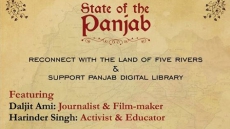The Apollo moon landing was faked and the existence of UFOs is a government cover-up. Climate change is a left-wing conspiracy, and the terrorist attacks of 9/11 were an inside job.
Such wild conspiracies have captured tabloid headlines, air-time and online followings, and are as differing as they are difficult to believe. But what do they have in common?
On Feb. 10, Dr. Farhad Dastur – a cognitive and evolutionary scientist at Kwantlen Polytechnic University (KPU) – will reveal the psychology behind superstitions, personal illusions and mass delusions at the fifth instalment of the KPU-Science World Speaker Series.
“We live in an age of anxiety. Every day the media reminds us to be afraid of a world full of threats: we’re immersed in images of terrorism, epidemics, catastrophic weather, environmental collapse, violent crimes, economic woes, international conflict, corporate corruption, privacy breaches and political scandals,” said Dastur, who points out that vast numbers of people – regardless of age, gender, race and politics – believe in conspiracies and cover-ups.
“When confronted with such chaos, the mind naturally seeks patterns and order. Belief in conspiracies and superstitious thinking are the patterns that make meaning out of uncertainty.”
What are the causes and consequences of such beliefs? All will be answered at 7 p.m. on Feb. 10 in Dastur’s talk – Such Seething Brains, Such Shaping Fantasies: The Quest for Meaning in an Age of Anxiety, Conspiracies, and Superstitions.
The KPU-Science World Speaker Series aims to engage, entertain and educate guests with fascinating insights into the world of science. Previous talks featured the internationally acclaimed Borealis String Quartet on music and science, Dr. Kent Mullinix on sustainable food systems for the 21st century; Dr. David P. Burns on citizen science, and; Dr. Rajiv Jhangiani on the psychology of good and evil.
Dastur’s research interests include visual and olfactory perception, open education, intersection collisions between cars and motorcycles, and the role of anxiety on illusory pattern perception.
For more on the KPU-Science World speaker series, visit kpu.ca/scienceworld.
KPU-SCIENCE WORLD SPEAKER SERIES
WHEN: Wednesday, February 10 at 7 p.m. Doors at 6:30 p.m.
WHERE: TELUS World of Science. 1455 Quebec St. Vancouver
INFO: The event is free and open to the public. Guests must register in advance at kpu.ca/scienceworld.



